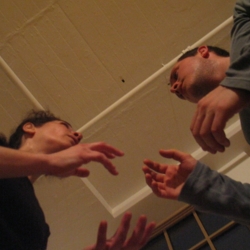Practice


The process of developing performances is a practice as well as an art.
The work of Urban Research Theater is based on the understanding that theatrical performance and embodied practice are two sides of the same coin. We are dedicated to carving out urban spaces in which the connections between art and practice can be rediscovered and developed over the long term.
The creative work of the performer is the basis of everything we do.
Our basic techniques include:
- Rigorous, playful, organic physical training
- Spontaneous (improvised) vibratory singing
- Elements of naturalistic acting
- The development of precise performance scores
We approach every technique as an invitation to arrive more deeply into the present. The forms we use are as simple as possible, designed to call forth the whole person to availability through the continuous demand for precision and embodied risk.
Form and technique also serve to protect the intimacy of the individual. This is what we ultimately strive to make visible, in an honest way, through patience and courage.
The core partnership of Urban Research Theater meets four to six days per week to train and develop new performance scores and techniques. Our process is based on not skipping any steps. As a partnership, we alternate between the roles of "doer" and "outside eye" in order to move as quickly as possible towards greater levels of precision and depth. We have discovered in practice that true spontaneity arises naturally out of rigorous technique, and vice versa.
Our performances, called Song Cycles, arise directly out of these exploratory practices. For more writing, please see the archive of our monthly newsletter. We also invite your participation in a number of external projects throughout the year.
Urban Research Theater "exemplifies the qualities of physical training, formal adventurousness and intellectual rigor that represent the very best notions of theatre research."
- Lane Pianta, Songscapes (MFA Thesis)
Towson University, 2008